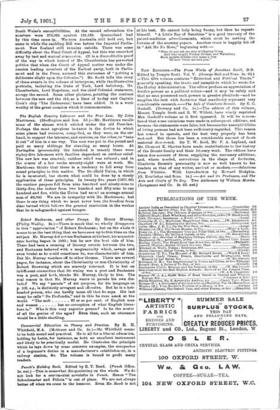The English Country Labourer and the Poor Law. By John
Martineau. (Skeffington and Son. 6d.)—Mr. Martineau recalls some of the abuses which existed under the old Poor-law. Perhaps the most egregious instance is the device to which some places had recourse, compelled, as they were, on the one hand, to support the labourer, and anxious, on the other, to "take it out" of him in some way. The man was put in the pound and paid so many shillings for standing so many hours. At Faringdon (presumably the hundred is meant) there were eighty-five labourers with families dependent on outdoor relief. The new law was enacted; outdoor relief was refused ; and in the course of a few weeks seventy-eight were at work. Mr. Martineau thinks that there is a tendency to fall away from sound principles in this matter. The BrAfield Union, in which he is interested, has shown what could be done by a steady application of these principles. In twenty-five years (1871-96) the outdoor paupers fell from nine hundred and ninety-nine to thirty-five, the iudoor from two hundred and fifty-nine to one hundred and five, while the Union had saved an average annual sum of $6,000 We are in sympathy with Mr. Martineau; but there is one thing which we must never lose, the freedom from class hatred which follows the general conviction in the worker that he is safeguarded against hunger.


















































 Previous page
Previous page